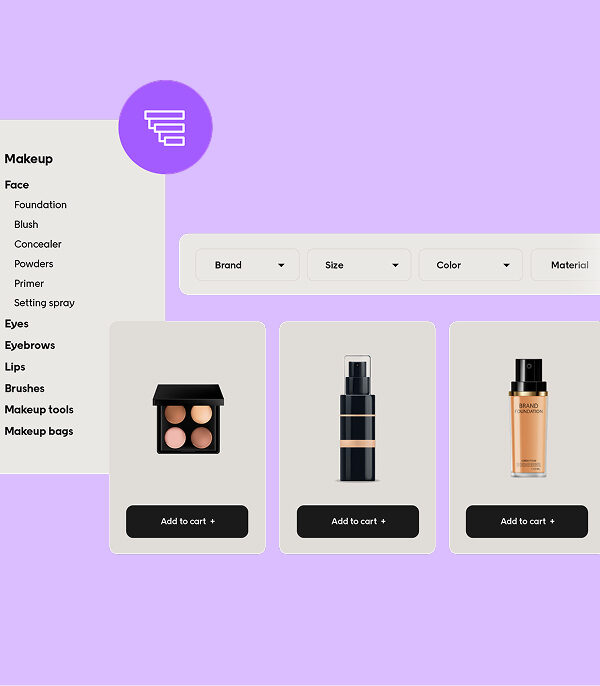TL;DR
- Omnichannel e-commerce platforms connect online and offline sales into one seamless customer journey.
- Retailers can manage customer data across multiple channels to deliver consistent customer experiences.
- The best omnichannel commerce software boosts customer satisfaction, loyalty, and business growth.
- A strong omnichannel strategy drives higher conversion rates and average order value.
- Choosing the right platform ensures scalability, personalization, and seamless integration with existing systems.

Shoppers don’t think in channels anymore. They expect to move from mobile apps to online stores to physical stores without friction. If the experience isn’t consistent, they leave.
Most retailers still juggle disconnected sales channels and scattered customer data. Without an omnichannel e-commerce platform, it’s impossible to deliver personalized experiences or manage online and offline sales in sync. That means lost revenue and weaker loyalty.
An omnichannel commerce platform changes this. It unifies customer interactions, manages customer data in one hub, and powers the kind of customer engagement customers now expect.
Today, you’ll learn why omnichannel retail is essential in 2026 and review the best omnichannel e-commerce platforms to help your business grow.
Why modern retail depends on an omnichannel e-commerce platform
An omnichannel e-commerce platform brings every sales channel together. Instead of running your online store, mobile app, and brick-and-mortar stores separately, it connects them in one system. This way, you can manage customer data centrally and deliver a consistent customer experience across all channels.
But here’s why omnichannel is important: customers expect seamless journeys across digital and physical stores. If retailers cannot meet these expectations, loyalty drops fast.
The difference from multichannel commerce is clear:
- Multichannel = channels in silos with limited insight
- Omnichannel = connected customer interactions across multiple touchpoints
- Outcome = unified data, personalized customer experiences, and stronger brand loyalty
Modern omnichannel commerce software goes beyond connecting channels by integrating with CRM systems and customer data platforms.
It also supports AI-driven product discovery and helps retailers launch targeted marketing campaigns.
Need something that connects smoothly with ERP and POS systems to keep operations aligned? It can do that too!
Together, these features set the foundation for sustainable business growth.
12 best omnichannel e-commerce platforms for retailers in 2026
Finding the right omnichannel e-commerce software can feel overwhelming.
To help you, we put together a list of the leading platforms that unify customer data, connect online and offline channels, and support business growth in 2026.
1. Voyado

Best for: Retailers who want personalization, loyalty, and engagement in one hub.
Voyado is built specifically for retail.
It combines omnichannel marketing, loyalty programs, and customer data into a single platform. That makes it easier to manage customer interactions across multiple channels and create personalized customer experiences that boost brand loyalty.
Key features:
- Unified customer data and purchase history
- Retail-focused personalization and automation
- Built-in loyalty and omnichannel engagement tools
- Scalable for online and offline sales
Why choose Voyado? Because it’s not a generic enterprise tool. It’s designed for the needs of retailers, helping you grow average order value and customer satisfaction while staying flexible.
Explore more about Voyado to see why it stands out among the best omnichannel customer experience platforms.
2. Shopify Plus

Shopify Plus is a popular e-commerce platform for high-growth brands. It offers strong support for online stores and apps, with options to extend into omnichannel retail.
Best for
Small to mid-size businesses that want a scalable e-commerce site with multiple integrations.
Core omnichannel features
- Unified online and offline sales through Shopify POS
- App marketplace for SMS marketing, live chat, and loyalty
- Integrations with CRM systems and ERP tools
- Support for mobile apps and social commerce
Pros
- Easy to set up and manage
- Large ecosystem of apps and partners
- Flexible pricing and customization options
Cons
- Heavy reliance on third-party apps for advanced omnichannel features
- Limited built-in customer data management compared to enterprise tools
3. Salesforce Commerce Cloud

Salesforce Commerce Cloud is an enterprise-grade commerce cloud solution. It connects online shopping, mobile apps, and in-store experiences through the wider Salesforce ecosystem.
Best for
Enterprises that want deep CRM integration and advanced reporting.
Core omnichannel features
- Seamless integration with Salesforce CRM systems
- AI-powered personalization with Einstein
- Support for multiple channels, including mobile, social, and messaging apps
- Advanced reporting and analytics
Pros
- Strong data unification with Salesforce CRM
- Broad ecosystem of add-ons and integrations
- Excellent scalability for global brands
Cons
- High cost compared to other platforms
- Can be complex to implement and maintain
4. Adobe Commerce (Magento)

Adobe Commerce is the enterprise version of Magento, offering a flexible, customizable e-commerce site for omnichannel strategies.
Best for
Brands that want complete control over platform customization.
Core omnichannel features
- Advanced product catalog management across multiple channels
- Integration with Adobe Experience Cloud for marketing efforts
- Customer data platform connections for personalization
- Built-in support for B2B and B2C sales
Pros
- Extremely customizable with open-source flexibility
- Wide partner network for extensions
- Strong support for global, multi-store retailers
Cons
- Requires significant developer resources
- Higher total cost of ownership than SaaS competitors
5. Oracle Commerce Cloud

Oracle Commerce Cloud is a cloud-native platform designed for enterprises. It combines e-commerce, customer data, and analytics in a single hub.
Best for
Large enterprises seeking a single platform for online and offline channels.
Core omnichannel features
- Integration with Oracle’s broader CX and ERP systems
- Unified data across customer interactions
- AI-driven product recommendations and targeted marketing campaigns
- Support for B2C and B2B commerce
Pros
- Strong enterprise integrations
- Reliable infrastructure for global rollouts
- Built-in analytics and reporting
Cons
- Best suited for very large organizations
- Less agile than newer cloud-native solutions
6. BigCommerce Enterprise

BigCommerce Enterprise offers a flexible SaaS platform for growing retailers. It focuses on connecting digital channels and scaling with multiple integrations.
Best for
Retailers that want a balance of flexibility and ease of use at enterprise scale.
Core omnichannel features
- Native integrations with social media and marketplaces
- Headless commerce options for multiple touchpoints
- Built-in SEO and analytics tools
- Support for mobile app and digital channel expansion
Pros
- SaaS convenience with enterprise-grade features
- Strong performance and uptime
- Lower total cost of ownership compared to open-source tools
Cons
- Limited built-in loyalty and engagement tools
- Some advanced features require third-party apps
7. SAP Commerce Cloud

SAP Commerce Cloud is a powerful omnichannel commerce solution designed for enterprises managing complex operations. It supports multiple channels and integrates deeply with SAP’s ERP systems.
Best for
Large enterprises that need to align commerce with supply chain and business objectives.
Core omnichannel features
- Seamless integration with ERP and CRM systems
- Unified customer data and order management across online and offline channels
- Support for B2B and B2C commerce
- Personalization options powered by customer intent and purchase history
Pros
- Strong back-end integrations for large-scale businesses
- Flexible for different channels and customer journeys
- Trusted enterprise-grade reliability
Cons
- Expensive and complex to deploy
- Overkill for small businesses
8. Bloomreach Commerce

Bloomreach positions itself as an omnichannel e-commerce management platform that focuses on personalization and customer engagement.
Best for
Retailers that want advanced personalization and search capabilities to create consistent customer experiences.
Core omnichannel features
- AI-driven product discovery and recommendations
- Deep integration with customer data platforms
- Supports targeted marketing campaigns across multiple platforms
- Analytics for customer behavior and conversion rates
Pros
- Leading personalization and search capabilities
- Helps boost average order value with relevant recommendations
- Strong fit for data-driven retailers
Cons
- Requires technical setup for full use
- Pricing can scale quickly for enterprise features
9. Elastic Path

Elastic Path is a headless omnichannel ecommerce platform built for flexibility. It enables retailers to deliver customer experiences across multiple touchpoints without being tied to one front-end system.
Best for
Brands that want control over digital channels and front-end experiences.
Core omnichannel features
- Headless architecture for multiple platforms and messaging channels
- Support for online stores, mobile apps, and in-store experiences
- APIs to integrate with CRM systems, ERP, and CDPs
- Designed for seamless integration with marketing efforts
Pros
- High flexibility to design unique customer experiences
- Supports rapid innovation across channels
- Scalable for different business needs
Cons
- Requires strong technical resources
- Not as out-of-the-box as traditional platforms
10. NetSuite Commerce

NetSuite Commerce is Oracle’s omnichannel commerce platform that combines ERP, CRM, and commerce in one.
Best for
Retailers that want a single platform to unify business operations and customer interactions.
Core omnichannel features
- Central hub for managing customer data and sales funnel insights
- Supports online and offline channels in one system
- Built-in analytics for deeper insights into customer behavior
- Consistent brand experience across digital and physical stores
Pros
- True single platform for ERP, CRM, and commerce
- Reduces complexity with one vendor solution
- Strong analytics and reporting
Cons
- Costly compared to lighter SaaS options
- Less flexible than headless-first competitors
11. Omnisend

Omnisend is an omnichannel retail software solution that focuses on marketing automation and customer engagement.
Best for
Small businesses and mid-market retailers that need to unify messaging across email, SMS marketing, and live chat.
Core omnichannel features
- Prebuilt workflows for email marketing, SMS, and push notifications
- Integration with e-commerce platforms and CRM systems
- Customer data unification for targeted campaigns
- Reporting to measure customer engagement and ROI
Pros
- Easy to set up with ready-made templates
- Affordable, with a free plan available
- Great for growing customer bases without heavy tech needs
Cons
- Lacks advanced enterprise-level features
- Not as strong on the commerce-side functions, like order management
12. Insider

Insider is an omnichannel e-commerce software platform built around personalization and customer engagement. It helps retailers create consistent customer experiences across multiple channels with AI-powered automation.
Best for
Retailers that want advanced personalization and cross-channel campaign management.
Core omnichannel features
- Unified customer data platform to manage customer interactions
- AI-driven recommendations to increase average order value
- Campaign automation across email marketing, SMS, push notifications, and messaging apps
- Analytics and advanced reporting for deeper insights into customer behavior
Pros
- Strong in delivering personalized customer experiences
- Wide channel coverage, including mobile apps and messaging channels
- Designed for business growth through targeted campaigns
Cons
- Enterprise-level pricing
- May be complex for small businesses with limited resources
These twelve solutions show the range of what’s possible with an omnichannel ecommerce platform.
Some focus on flexibility, others on deep enterprise integrations, and some, like Voyado, are built from the ground up for retail.
Next, let’s look at the benefits retailers gain from using an omnichannel e-commerce platform and why the right choice can reshape customer engagement and business growth.
Benefits of an omnichannel e-commerce platform for retailers
An omnichannel platform is more than just software. It helps retailers deliver the consistent brand experience customers expect while driving measurable business growth.
1. A unified customer journey
Customers switch between online shopping, mobile apps, and in-store visits. An omnichannel e-commerce platform unifies these touchpoints so the customer journey feels seamless across multiple channels.
2. Real-time inventory and order management
With online and offline sales connected, retailers can give accurate stock visibility, reduce missed sales, and streamline fulfillment across physical stores and digital channels.
3. Data-driven personalization
By managing customer data in a central hub, retailers can analyze purchase history, behavior, and customer intent. This makes it easier to deliver targeted marketing campaigns and personalized customer experiences that increase brand loyalty.
4. Higher conversions and loyalty
Omnichannel commerce software drives customer engagement by creating consistent customer experiences. The result is higher conversion rates, improved customer satisfaction, and sustainable business growth.
The benefits are clear: omnichannel retail software doesn’t just connect sales channels, it creates loyal customers and stronger margins.
So how do you make sure the platform you choose supports your business needs? Let’s break down what to look for in the best omnichannel e-commerce platforms.
What to look for in the best omnichannel e-commerce platforms
Choosing an omnichannel commerce platform isn’t just about features. It’s about finding a solution that aligns with your business objectives and supports customer expectations.
Feature 1: Seamless integration
The best omnichannel commerce software connects smoothly with ERP, POS, and CRM systems. This ensures consistent customer experiences across online and offline channels.
Feature 2: Customer data unification
A strong platform should manage customer data in one central hub. With a customer data platform, you can analyze purchase history, customer behavior, and interactions across multiple touchpoints.
Feature 3: Personalization capabilities
Look for AI-driven product discovery, targeted marketing campaigns, and tools that help deliver personalized customer experiences. Platforms featured in the best e-commerce personalization software are strong examples.
Feature 4: Cross-channel communication
Support for email marketing, SMS marketing, push notifications, and messaging apps is key to engaging customers across multiple platforms.
Feature 5: Scalability and reporting
From small businesses to global retailers, the platform should scale to match your growth. Built-in analytics and advanced reporting give deeper insights into performance and customer engagement.
These features make the difference between a platform that simply handles transactions and one that truly drives customer engagement.
Retailers that prioritize them will be ready to scale and adapt in 2026.
Over to you: How to choose the best omnichannel e-commerce platform for your business
The right omnichannel platform depends on your goals. Some retailers need a single platform to unify customer data and simplify operations.
Others prioritize advanced personalization, targeted marketing campaigns, or seamless integration with ERP and CRM systems.
Here’s a quick checklist to guide your choice:
- Unify customer data across online and offline channels
- Deliver consistent customer experiences across sales channels
- Support seamless integration with ERP, POS, and CRM systems
- Enable personalized customer experiences through AI and data insights
- Scale with your business needs, from small businesses to enterprise-level commerce cloud solutions
The good news is that today’s platforms adapt to different customer expectations and business objectives. What matters most is choosing a solution that drives loyalty, customer satisfaction, and business growth.
If you want a platform built specifically for retail, Voyado brings together omnichannel marketing and omnichannel engagement in one hub.
Book a demo today to see how Voyado can help you increase customer satisfaction, improve average order value, and future-proof your omnichannel strategy.
FAQs
What is an omnichannel e-commerce platform?
It’s a single platform that unifies customer data and connects all these channels into one hub. Retailers can manage online and offline sales, streamline customer service interactions, and deliver consistent customer experiences.
How is omnichannel different from multichannel e-commerce?
Multichannel means running separate sales channels, like an e-commerce site and physical stores, without integration. Omnichannel links them together so online transactions, in-store purchases, and digital channels work as one system.
Which platform is best for retail brands in 2026?
Retailers should focus on omnichannel marketing platforms built for their industry. Solutions like Voyado combine loyalty, personalization, and omnichannel engagement to increase customer satisfaction and business growth.
Can Shopify, Adobe, or Salesforce support omnichannel commerce?
Yes. These platforms extend beyond a basic e-commerce site with integrations that connect POS, CRM, and ERP systems. They can support omnichannel strategies, but often rely on add-ons to unify customer data and generate invaluable insights.
Why is personalization critical in omnichannel e-commerce in 2026?
Personalization helps retailers analyze purchase history and customer behavior across multiple channels. This leads to more relevant marketing campaigns, higher online sales, and better customer engagement.









